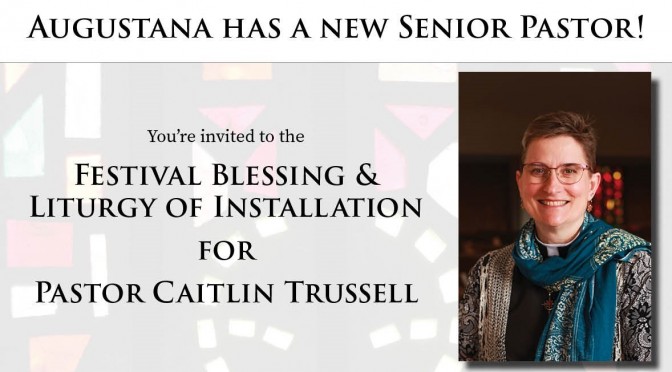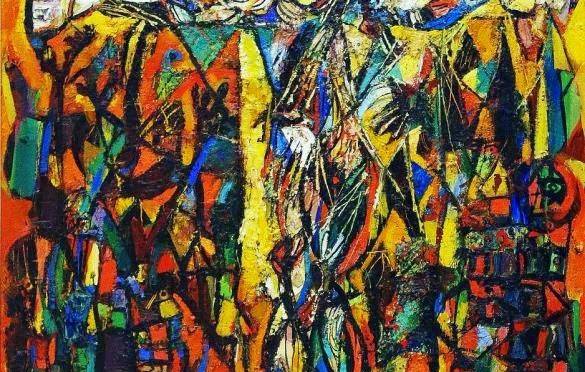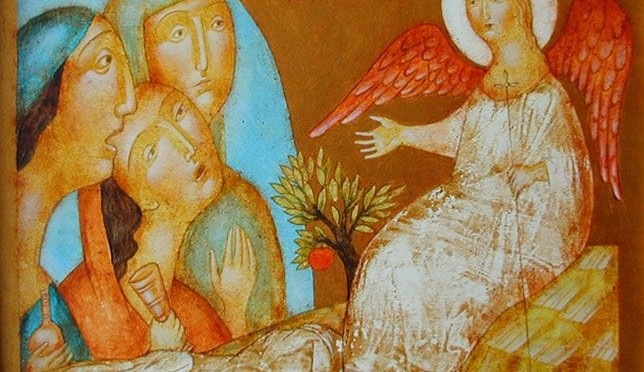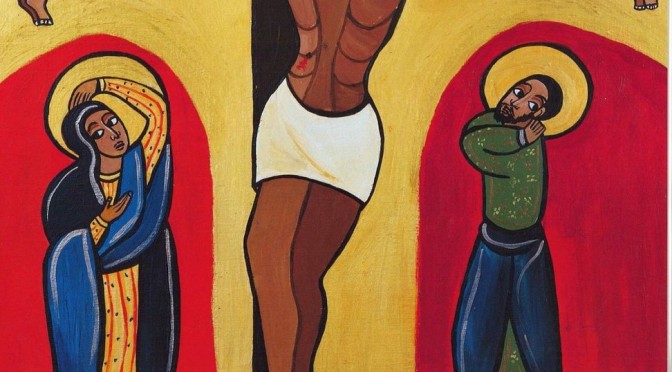Caitlin Trussell with Augustana Lutheran Church on July 14, 2024
[sermon begins after two Bible readings; reading from Amos is at the end of the sermon]
Mark 6:14-29 King Herod heard of [the disciples’ preaching,] for Jesus’ name had become known. Some were saying, “John the baptizer has been raised from the dead; and for this reason these powers are at work in him.” 15 But others said, “It is Elijah.” And others said, “It is a prophet, like one of the prophets of old.” 16 But when Herod heard of it, he said, “John, whom I beheaded, has been raised.”
17 For Herod himself had sent men who arrested John, bound him, and put him in prison on account of Herodias, his brother Philip’s wife, because Herod had married her. 18 For John had been telling Herod, “It is not lawful for you to have your brother’s wife.” 19 And Herodias had a grudge against him, and wanted to kill him. But she could not, 20 for Herod feared John, knowing that he was a righteous and holy man, and he protected him. When he heard him, he was greatly perplexed; and yet he liked to listen to him. 21 But an opportunity came when Herod on his birthday gave a banquet for his courtiers and officers and for the leaders of Galilee. 22 When his daughter Herodias came in and danced, she pleased Herod and his guests; and the king said to the girl, “Ask me for whatever you wish, and I will give it.” 23 And he solemnly swore to her, “Whatever you ask me, I will give you, even half of my kingdom.” 24 She went out and said to her mother, “What should I ask for?” She replied, “The head of John the baptizer.” 25 Immediately she rushed back to the king and requested, “I want you to give me at once the head of John the Baptist on a platter.” 26 The king was deeply grieved; yet out of regard for his oaths and for the guests, he did not want to refuse her. 27 Immediately the king sent a soldier of the guard with orders to bring John’s head. He went and beheaded him in the prison, 28 brought his head on a platter, and gave it to the girl. Then the girl gave it to her mother. 29 When his disciples heard about it, they came and took his body, and laid it in a tomb.
Ephesians 1:3-14 Blessed be the God and Father of our Lord Jesus Christ, who has blessed us in Christ with every spiritual blessing in the heavenly places, 4 just as he chose us in Christ before the foundation of the world to be holy and blameless before him in love. 5 He destined us for adoption as his children through Jesus Christ, according to the good pleasure of his will, 6 to the praise of his glorious grace that he freely bestowed on us in the Beloved. 7 In him we have redemption through his blood, the forgiveness of our trespasses, according to the riches of his grace 8 that he lavished on us. With all wisdom and insight 9 he has made known to us the mystery of his will, according to his good pleasure that he set forth in Christ, 10 as a plan for the fullness of time, to gather up all things in him, things in heaven and things on earth. 11 In Christ we have also obtained an inheritance, having been destined according to the purpose of him who accomplishes all things according to his counsel and will, 12 so that we, who were the first to set our hope on Christ, might live for the praise of his glory. 13 In him you also, when you had heard the word of truth, the gospel of your salvation, and had believed in him, were marked with the seal of the promised Holy Spirit; 14 this is the pledge of our inheritance toward redemption as God’s own people, to the praise of his glory.
[sermon begins]
Wonder with me for a minute about how different the world might be if each person in the world lived in grace and hope. If each person in the world understood themselves as formed by love for love. Let’s wonder with the letter to the Ephesian church that opens with the powerful blessing we heard today. The letter was likely sent in copies to the wider church, not just the Ephesians. The letter is to new converts following the Way of Jesus, both Jews and Gentiles (non-Jews), who are struggling to get along with each other. Christians who are learning the Jesus Way and challenged by their different opinions about what the church should be and do. The letter opens with this gorgeous blessing, flowing with hope. Phrases like, “glorious grace freely bestowed by the Beloved.” (The Beloved being Jesus.) And in the Beloved, “…we have redemption…through the riches of his grace that he lavished on us…” Those 1st century siblings in the faith “set [their] hope on Christ” as do we in the 21st century.
I invite you to take your worship bulletin home and re-read this opening blessing again. Underline the words that jump out at you. Cut it out. Tape it to your bathroom mirror or use one of your many fridge magnets to keep it front and center. If you’re anything like me, setting our hope on Christ gets slippery between Sunday mornings. The challenges of life, work, relationships, and politics can weary even the most faithful among us. It’s why we need each other as a reminder of the hope to which we cling when the world serves up horror on a platter.
I mean, good grief, don’t we have enough happening in the world without stories like these on Sundays?! King Herod Antipas, a.k.a. King Herod in our Bible story today, murdered many, many people who were threats to his power and executed John the Baptist on shameless impulse.[1]
This king was the son of THE King Herod who tried to manipulate the magi from the East and who murdered babies to eliminate the newborn king of the Jews.[2] Murderous mayhem ran in the family and attracted others like Herodias who King Herod Antipas stole from his brother Philip. Herodias had an opportunity and took it to rid herself of the pesky prophet for whom she carried a grudge because John wouldn’t stay quiet about her illicit marriage. Up to this point in the Gospel of Mark, demons and disease were causing the problems. King Herod Antipas added “depraved dictator” to the list of things working against God’s kingdom. The king liked listening to John’s teaching but not enough to let him live. John’s disciples braved a similar fate when they asked for his body to bury. It’s difficult to imagine their courage. They must have loved John very much to risk such a thing.
We don’t know what Jesus thought about John’s death. In the first chapter of Mark, Jesus’ ministry launched after John’s arrest.[3] It’s possible that Jesus’ launch was partly inspired by the arrest. And John’s execution foreshadows Jesus’ execution. Not only is someone NOT a prophet in their own hometown, as Jesus said at the beginning of this sixth chapter of Mark, but they apparently don’t live long after prophesying against preeminent power.
This summer’s book recommendation was brought to us by Augustana’s Human Dignity Delegates – The Cost of Discipleship by Dietrich Bonhoeffer. Leave it to this ministry to offer the seeming opposite of a “beach read,” although ironically it may be the perfect book to read on a beach given the United States entrance into World War II was on the beaches of Hawaii and France. Bonhoeffer was a German Lutheran theologian and pastor who lived as the Nazis rose to power in the 1930s. He is widely admired for his opposition to Hitler and the Nazis, resisting their influence on the Protestant Church as he founded the Confessing Church. His resistance led to his arrest, imprisonment, and execution in concentration camp. If Lutherans had saints, he’d likely be one of them.
In The Cost of Discipleship written in 1937, Bonhoeffer believed that discipleship includes personal sacrifice while we live out our faith in the world. He makes a distinction between “cheap grace” that requires nothing of us versus “costly grace” that inspires action to make a difference in the world. It’s costly not because God requires something from us before we’re given God’s grace. It’s costly because God lavishes grace so freely how could we do anything else but respond to it with our whole lives for the sake of the world. Bonhoeffer coached the local church to be a place where individuals can learn to act through their faith. Read The Cost of Discipleship. All are welcome for the book discussion after 10:30 worship on August 18th.
In times of societal stress, there can be either a temptation to look away from the things that make us uncomfortable or a temptation to confront others in ways that demean and degrade our shared humanity. We mute ourselves or we scream back. Things have gotten even more complicated these days as some other Christian denominations are the face of public Christianity, believing that Jesus is only on our country’s side and NOT on the side of the whole world so loved by God. The desire to distance from those Christians and to go quiet is understandable. But Christianity has always been practiced by a wide variety of people. See the 1st century Ephesian church as one example.
In the United States, our Founders separated the church and state with the belief that King George wasn’t any more divine than anyone else. Because of the Founders’ efforts, we are free to speak our minds and free to practice any religion in this country we call home. The first Amendment to the United States Constitution protects freedoms of religion, speech, press, assembly, and petition. As Jesus’ followers and as United States’ citizens, we are two things at once. It’s helpful that Christian theology makes space for being two things at once – saint and sinner, bound and free, fearful and courageous, weak and strong, wise and foolish. Being a faithful citizen fits nicely into the Founder’s framework. Things go awry when faithful people decide that the country must be a theocracy, that it must be Christian under divine authority. This is called Christian Nationalism and its neither Christian nor patriotic.
We freely worship this morning as Christians in a country that is NOT a Christian country. As our cousins in faith who are Jews and Muslims, as well as any number of spiritual or nonreligious folks, go about their Sunday mornings doing whatever they feel free to do.
As Jesus’ followers, listening to Mark’s gospel reading about John the Baptist’s death, how are we to understand the risks that we’re called into as Jesus’ followers on behalf of the world God loves? We tend to admire the courage of folks like John the Baptist and Dietrich Bonhoeffer after the fact, well, after their political executions anyway. But how do we hear prophets in our own day, calling us to account for the state of the world in which we all play a part. It’s easy to not be political when the current politics of the day are working in our favor. But how are we to act when the politics of the day don’t work in our neighbors’ favor? These are the tough questions we wrestle with when we speak against the Israeli government’s policies killing Palestinian people while we simultaneously stand with Jews in our families and around the world against antisemitism. Similarly, we speak to our own elected leaders about issues that may not personally affect us but affect our unhoused neighbors or our abused neighbors or our otherwise struggling neighbors.
More importantly, we speak to those elected leaders WITH our neighbors who are directly affected by policies that harm or exclude them. This is what the words accompaniment and advocacy mean – working with our neighbors for our neighbors. This is why our Augustana Human Dignity Delegates advocate and accompany alongside groups like Lutheran Advocacy Ministry Colorado and Together Colorado, groups of faith-based people who talk with and “petition” our public figures and elected leaders about issues of human dignity. (See Amendment I of the United States Constitution.)
We default so quickly into quiet self-preservation over and against lives being lost every day because of greed and political posturing. Yet, as the church we are told in scripture and in our worship that we are the body of Christ in the world. Christ the Beloved who freely bestows glorious grace through the cross. The risen Christ in whom we set our hope and from whom the riches of God’s grace are lavished upon us. When we are faced with the horrors of this world, we neither curl up in despair nor behave like the very enemy we say is the problem. Rather, we are Christ’s body in the world, revealing Christ courageously to the world with the lavish, glorious grace we first received from God. Something to celebrate as we sing…
#1050 in All Creation Sings Sometimes Our Only Song is Weeping
_________________________________________
[1] Matt Skinner, Professor of New Testament, Luther Seminary, St. Paul, MN. Commentary on Mark 6:14-29 for Sunday, July 14, 2024. Commentary on Mark 6:14-29 – Working Preacher from Luther Seminary
[2] Read Matthew 2, the whole chapter.
[3] Mark 1:14
___________________________________________
Amos 7:7-15 This is what [the Lord God] showed me: the Lord was standing beside a wall built with a plumb line, with a plumb line in his hand. 8 And the Lord said to me, “Amos, what do you see?” And I said, “A plumb line.” Then the Lord said,
“See, I am setting a plumb line
in the midst of my people Israel;
I will never again pass them by;
9 the high places of Isaac shall be made desolate,
and the sanctuaries of Israel shall be laid waste,
and I will rise against the house of Jeroboam with the sword.”
10 Then Amaziah, the priest of Bethel, sent to King Jeroboam of Israel, saying, “Amos has conspired against you in the very center of the house of Israel; the land is not able to bear all his words. 11 For thus Amos has said,
‘Jeroboam shall die by the sword,
and Israel must go into exile
away from his land.’ ”
12 And Amaziah said to Amos, “O seer, go, flee away to the land of Judah, earn your bread there, and prophesy there; 13 but never again prophesy at Bethel, for it is the king’s sanctuary, and it is a temple of the kingdom.”
14 Then Amos answered Amaziah, “I am no prophet, nor a prophet’s son; but I am a herdsman, and a dresser of sycamore trees, 15 and the Lord took me from following the flock, and the Lord said to me, ‘Go, prophesy to my people Israel.’ ”

![Glorious Grace [OR Christians in a Country that Separates Church from State] Mark 6, Ephesians 1, and Amos 7](https://caitlintrussell.org/wp-content/uploads/2024/07/church-and-state-street-sign-672x372.jpg)
![Dance Lessons [OR Your Faith Has Not Failed You When You Can’t Get Better] Mark 5:21-43, Psalm 30, and Lamentations 3:22-33](https://caitlintrussell.org/wp-content/uploads/2024/06/Dance-Bollywood-Jane_Ensemble-3_Photography-By-Matthew-Cawrey-1024x684-672x372.jpg)
![Pride: All the Law and the Prophets Hang on Loving God and Each Other [OR The Greatest of All Shrubs is NOT a Good Story]](https://caitlintrussell.org/wp-content/uploads/2024/06/rainbow-jesus-christian-lgbtq-christian-lgbt-gay-pride-tony-rubino-672x372.jpg)

![The Life of the Party [OR The Sabbath is for Delight, Worship, and Laying Aside Ordinary Work]](https://caitlintrussell.org/wp-content/uploads/2024/06/Pentecost-Dance.Glenda-Dietrich.-600x372.jpg)



![Who has been Jesus for you? John 3:14-21 [OR Would Someone Please Put John 3:17 on the Poster, Too?]](https://caitlintrussell.org/wp-content/uploads/2024/03/Luke-Allsbrook-Jesus-Washes-the-Disciples-Feet.-2018-oil-on-canvas--672x372.jpg)
![The Wonder of It All [OR Hope Dazzles on a Mountaintop] Mark 9:2-9](https://caitlintrussell.org/wp-content/uploads/2024/02/Transfiguration.Armando-Alemdar.Ara_.2004.GNU-Free-Documentation-License-672x372.jpg)